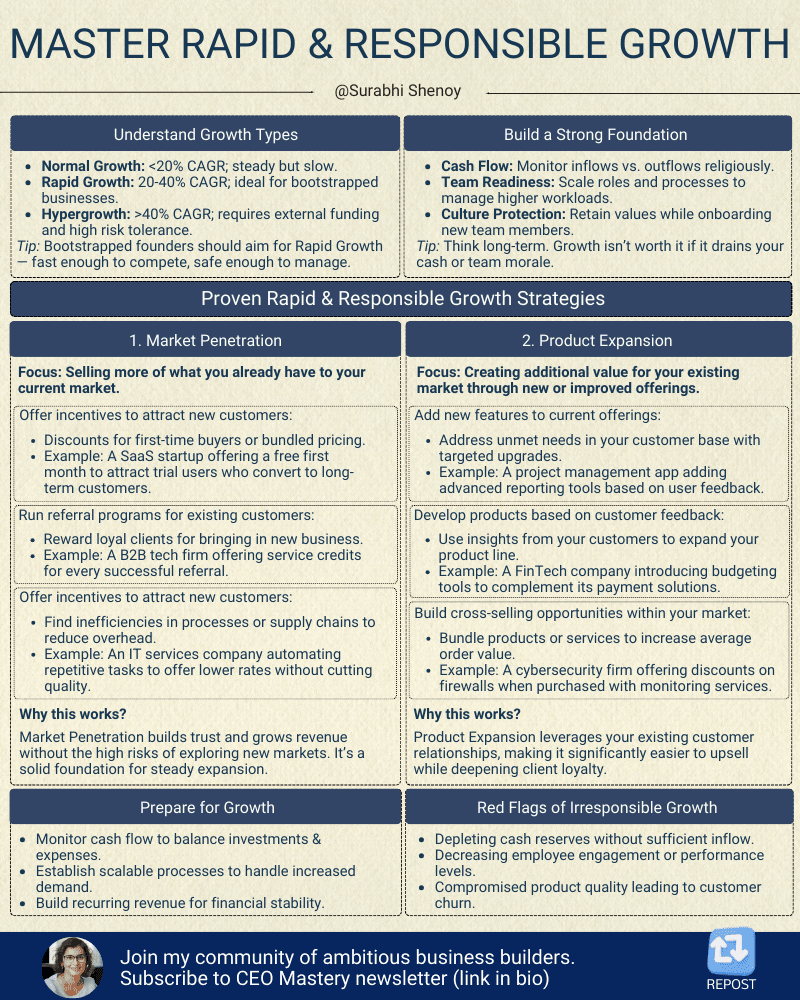Learn how to grow your bootstrapped tech business, and the 5 essentials you need for scaling.
In this edition, we’ll dive deep into mastering growth for your company. I’ll share with you:
- The real meaning of “growth”
- The right growth type for your business
- Balancing rapid and responsible growth
- My top two strategies for growth
- How you can prepare for growth
Let’s dive in.
What does Growth really mean?
There’s a lot more to growth than just numbers.
It’s about sustainable expansion that adds real value to your business.
Here are 3 tiers of growth you need to understand:
- Normal Growth: Companies with CAGR below 20%
- Rapid Growth: Companies with CAGR between 20% and 40%
- Hyper Growth: Companies with CAGR of 40% or more
Hypergrowth often requires significant funding and is common for venture-backed startups.
For self-funded businesses like yours, target rapid growth but do it responsibly. That means expanding your business in a manageable way.
Here are 5 key benefits of responsible rapid growth:
- Sustainability: Fund your growth through revenue.
- Freedom: Retain full ownership and decision-making power.
- Quality: Provide the same experience your customers are used to.
- Risk Management: Lower chance of overextension or cash flow crisis.
- Culture: Preserve your company’s core values and culture during expansion.
Rapid growth, defined as a CAGR of 20-40%, provides the perfect balance, allowing you to outpace the market while maintaining control over your operations.
Why should you seek this balance?
As someone who has navigated this journey twice, I’ve learned that balancing rapid and responsible growth is crucial. Rapid growth keeps you competitive, while responsible growth ensures you don’t stretch your resources too thin.
Be aware: irresponsible growth can be costly and damage:
- Your financial stability
- Your market reputation
- Your ability to attract top talent
Your growth strategy will significantly impact your success. Founders who plan and adapt thrive by building resilient, capable organizations – not just scaling up.
Now that you understand the importance of balanced growth, let’s get practical:
How do you craft your Growth Strategy?
Here are two strategies that have worked for me:
1. Market Penetration
This is a good place to start if you are a Tech company with little differentiation from competitors, like an IT services/consulting company.
With this strategy, you focus on selling more of your existing products or services in your current market.
This can involve:
- Offering incentives to new clients
- Lowering prices to attract more customers
- Providing referral rewards to existing customers
In my tech company, we worked on enhancing operational efficiency, which allowed us to offer competitive rates. This increased our market penetration, attracted more clients, and increased our market share.
2. Product Expansion
Introduce new products to your current market.
This could mean:
- Expanding your product line, or
- Adding new features to existing products
We applied this strategy by developing new FinTech products based on insights from our existing clients. This not only added to our offerings but also deepened our client relationships, leading to sustained growth.
While we’ve focused on market penetration and product expansion, there are more growth strategies available. I’ve found these two to be particularly effective for self-funded companies.
When you craft your growth strategy, consider your unique market position, strengths, and customer needs. Start with the one that best fits your current situation, and adapt as your company evolves.
How do you prepare for growth?
The first step is to understand your capacity for growth.
Here are key areas to focus on:
1. Balance cash consumption and generation
Ensure that your cash outflows do not exceed your inflows. Monitor expenses closely and adjust spending based on revenue trends.
This balance is crucial to avoid running out of funds as your business grows.
2. Understand your SFG Rate and Run rate
Calculate the projection of your Self-Financeable Growth (SFG) rate to know how fast you can grow using internal funds. Track your run rate hawkishly to ensure you have enough contingency reserves. Remember, it’s financially and operationally easier to hire than to fire.
This allows you to make informed decisions about expansion pace and resource allocation.
3. Prepare for increased volume/workload
As you grow, your ability to manage increased volume becomes crucial. Strengthen your project management and operational processes to maintain efficiency.
The goal is to create a foundation that allows your business to grow without proportionally increasing overhead or sacrificing quality.
4. Adaptable leadership and resilient culture
As you grow, your current team’s roles will change. You’ll onboard new team members. This change and expansion can challenge your existing culture and communication structures.
Maintaining your company’s core ethos while welcoming fresh perspectives is key to sustainable growth.
5. Keep the money flowing
Build a strong sales pipeline to ensure a continuous inflow of opportunities. Secure long-term contracts to provide revenue stability.
Focus on generating recurring revenue to sustain your business through various growth stages. Know when to say No!
This predictable income will give you the confidence to keep growing rapidly (and responsibly!).

Surabhi
Ready to master your CEO game?
Here are 2 ways I can help
1) Elite CEO Coaching:
Strategic support to scale systematically
→ Book Your Free Clarity Call
2) 1:1 Strategy Session
One focused hour. Clear action plan. Immediate implementation.
→ Get a Power Hour With Me




